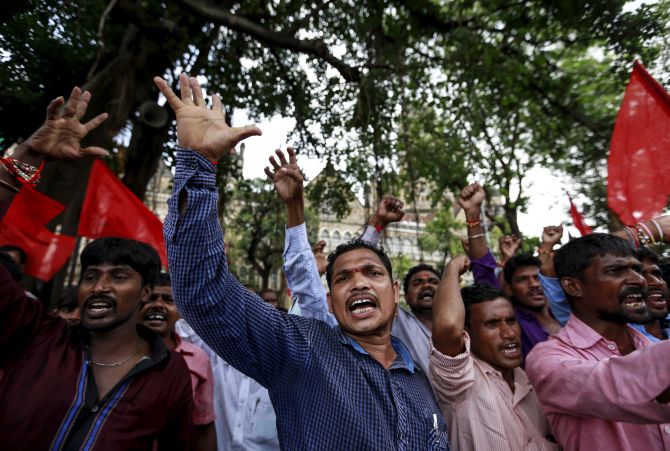
On Friday, September 2, trade unions associated with the Left parties have called for a countrywide general strike of workers.
Tapan Kumar Sen, general secretary, Centre of Indian Trade Unions, the Communist Party of India-Marxist’s trade union, and a Rajya Sabha MP, spoke to Rediff.com‘s Syed Firdaus Ashraf on why workers across the nation are going on a strike.
Why have you called a general strike?
All central trade unions in the country have collectively put 12 demands before the government. We have been making those demands for the past three years. We went on a strike a year ago too.
Whatever the Modi government promised (at that time) has not been done in the last one year.
At Union Finance Minister Arun Jaitley’s press conference, the government made a mockery of our demands.
We reject that (the government’s wage hike) altogether, particularly the minimum wage the amount they offered.
The minimum wage that is offered (by the Centre) already exists in many states of the country. What new (measures) have they offered?
The minister made a statement that this is as per the recommendation by the minimum wage committee. It is absolutely false. The minimum wage advisory committee meeting, which was held yesterday (Monday, August 29) ended inconclusively.
No recommendation was made. Arun Jaitley made a statement that (we) have accepted the minimum wage recommendation and on that basis, they are offering Rs 350 (a day for unskilled non-agricultural workers).
It is deceptive and fraudulent propaganda to confuse the people before the strike.
![]()
Do you mean the finance minister is lying?
Yes, he is lying. He said as per the the minimum wage advisory committee’s recommendation, he is making this offer. I told you that the meeting was inconclusive and no recommendation was made.
Now you decide who is lying and who isn’t? I am making this statement on record.
 Is the Modi government adopting anti-labour policies?
Is the Modi government adopting anti-labour policies?
(The) Modi government is serving the corporates — both domestic and foreign. And, naturally, they cannot be pro-labour — except for their statements in the media where they say they are pro-labour.
What about the Bharatiya Mazdoor Sangh, the labour union affiliated to the Bharatiya Janata Party? Is the BMS part of your strike?
No, they are not part of the strike. They told us they may join the strike, but now, finally, they say they are happy with the new rate and, therefore, they will not join the strike.
We are not happy and, therefore, we are going ahead with the strike.
The Modi government stooped so low that they are only talking to the BMS and not to other unions. They are not discussing (the issue) with the striking organisations.
Such an undemocratic exercise was never seen in post-Independence India. No government has done that.
Is it the government’s agenda to divide the trade unions?
Naturally, they are doing it for business houses. They want to divide the workers and unions.
We are seeing a lot of layoffs of late and the economy, too, is not picking up, but we don’t see people protesting or joining trade unions. Why there is so much disconnect between the masses and the unions?
Who says there is a disconnect between the masses and the trade unions?
Recently, trade unions compelled the Haryana government to withdraw its move to privatise power distribution companies.
There are struggles (going on) and all the trade unions are coming together and going for a countrywide strike.
Which industries will be affected by the strike?
We expect the strike to be effective everywhere. We expect that the banking and insurance sectors, central and state government offices, and coal and steel industries will be affected in a big way.
The construction and unorganised sectors will also be affected prominently, as people will be coming on the streets in big numbers.
Given the current economic structures coming up all over the world, what is the role for trade unions?
The situation, all over the world, is extremely hostile to trade unions, rather to workers. Workers are running the wheel of production and keeping it on.
It is the workers who are creating the wealth and their blood is getting sucked. So the trade unions have to resist this with all their might, come what may.
What are your 12 demands for which you are going on strike?
Apart from a cap on price rise, we have demanded a ban on speculation in the commodity market, as without that price rise cannot be contained.
Second, we want all contract workers to be regularised and given the same wage as regular workers. Currently, contract workers are not getting even one third of the wages of a regular worker.
Consequently, the number of regular workers is gradually decreasing and, all across the world, jobs are being dominated by contract workers.
Our other demands are: No privatisation of public sectors; no further FDI (Foreign Direct Investment) in defence, insurance, retail trade, banks and railways.
Whatever proposals are being made by the government in the name of labour reforms are designed to push out workers out of the purview of all labour laws.
In such a situation even if some wage rise was given to them, it will not benefit them because (most) workers will be on contract.
So those reforms must be scrapped. And these things must be done in consensus with the trade unions.
But for business to run, you must have flexible labour laws. If you have rigid laws who will invest in India?
Let them not come. You cannot treat your workers like beggars.
Without the purchasing power of people and without expansion of the market, nobody will come and invest. That is the scenario all over the world.
Investment is not coming because products are not saleable. People don’t have money.
Without ensuring demand management, any idea of expanding investment is absolutely utopian. There is a conflict of interest between the trade unions, the working class and corporate houses.
And in this situation, the government is acting like the agents of corporate houses.
If you have weak labour laws, investment will go to other countries.
Workers in other countries also are not enjoying good (living) conditions. Everywhere there has to be a benchmark which has to be ensured. Any civilised society must have a basic benchmark.
It sounds very good, but these things don’t work in the real world.
Workers cannot accept beggar’s treatment; it is better to die.
We have to fight to improve the living standards of the people. We are not only fighting for workers, but also for farmers, peasants and the entire producing community.
For them, we have to fight to the best of our strength and ability.
[source;rediff.com]



















